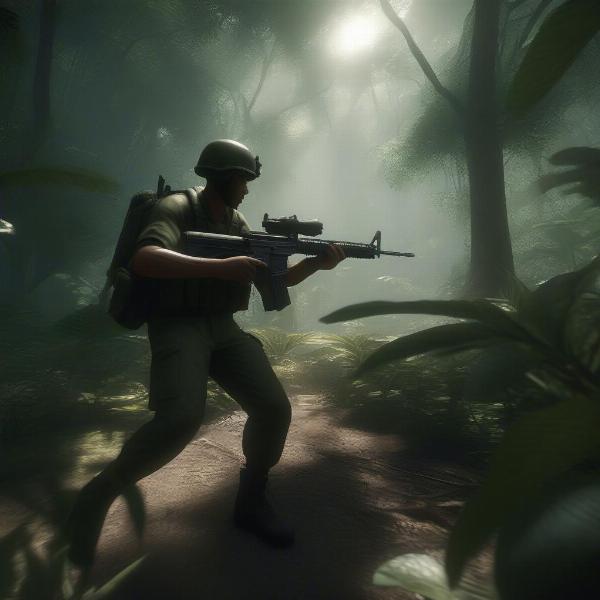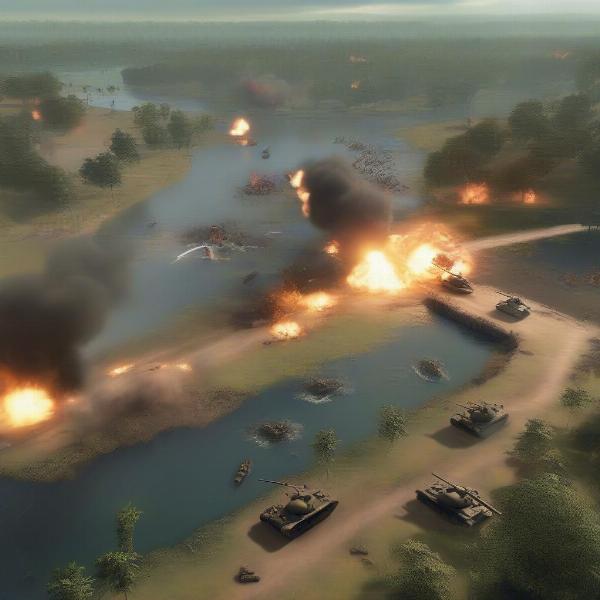The Vietnam War remains a significant and complex historical event, and its impact is still felt today. At SupremeDuelist.blog, we’ve always been fascinated by how games can explore and interpret such weighty subjects. In this article, we will be delving into the world of games that attempt to capture the essence of this conflict, analyzing their mechanics, their historical accuracy, and ultimately, their success in portraying one of the most defining events of the 20th century.
We aim to cover a range of titles, from realistic military simulators to more abstract and narrative-driven experiences. We’ll look at how different developers have chosen to approach the sensitive topic of the Vietnam War, touching upon everything from the jungles of Southeast Asia to the politics back home. Our goal is to provide a comprehensive overview for anyone interested in learning more about this critical piece of history through the lens of gaming.
What Makes Games About the Vietnam War So Compelling?
Games set during the Vietnam War often offer a unique blend of tension, drama, and strategic depth. The jungle environment is a character in itself, dense and unforgiving, providing both cover and danger. The asymmetric nature of the conflict, where guerilla tactics played a central role, also creates exciting and varied gameplay experiences. But beyond gameplay, these games allow us to explore the human stories, the sacrifices, and the complexities of a war that continues to provoke discussion and reflection.
 Vietnam war combat in dense jungle
Vietnam war combat in dense jungle
The Evolution of Vietnam War Games
The portrayal of the Vietnam War in games has changed significantly over the years. Early titles often focused on a simplistic “us vs. them” narrative, lacking nuance and historical accuracy. However, more recent games tend to provide a more balanced perspective, exploring the viewpoints of both American and Vietnamese combatants, and civilians caught in the middle. This shift reflects a greater maturity in game development, as well as a growing understanding of the war’s multifaceted nature.
The shift can be seen from the early arcade shooters to the more narrative and immersive experiences now available on modern gaming platforms. The technological progress has allowed developers to create more authentic and visceral experiences, with highly detailed graphics, realistic sound effects and engaging AI. We will dive into specific examples to demonstrate this change.
How Do Games Represent the Challenges of the Vietnam War?
The challenges of fighting in the Vietnam War are manifold. The hostile environment, the unpredictable nature of guerilla warfare, and the psychological impact of the conflict are not easily translated into game mechanics. Yet, many developers have found ingenious ways to capture these elements.
- Jungle Warfare: Games often utilize dense foliage and limited visibility to create a sense of claustrophobia and danger. Ambushes and hidden enemies are a common occurrence, emphasizing the need for vigilance.
- Guerilla Tactics: Many games implement AI that utilizes guerilla tactics like booby traps and hidden tunnels, creating an intense asymmetrical combat experience.
- Psychological Warfare: Some games explore the psychological toll of war through character development and challenging moral choices, often through dialogue and cutscenes.
- Resource Management: Many games depict the limited access to supplies of the combatants on both sides. This resource management adds to the strategy and difficulty of the game, requiring the player to think creatively.
“The challenge for any game developer tackling the Vietnam War is to balance entertainment with historical respect,” says Dr. Eleanor Vance, a historian specializing in Southeast Asian conflicts. “It’s not just about shooting enemies; it’s about understanding the complexities of the conflict and its lasting effects.”
Popular Examples of Games About the Vietnam War
Several noteworthy titles have attempted to capture the essence of the Vietnam War, each with its own unique approach. Here are a few prominent examples:
- Battlefield Vietnam: Known for its large-scale battles and vehicle combat, this game offered a compelling multiplayer experience that showcased the chaotic nature of the conflict.
- Call of Duty: Black Ops: This title featured a storyline that spanned multiple decades, with a significant portion set during the Vietnam War, exploring the dark side of Cold War covert operations.
- Rising Storm 2: Vietnam: A tactical shooter focusing on realism and teamwork, this game provided a more authentic and challenging experience of combat in Vietnam, emphasizing the importance of planning and communication.
- Radio Commander: This unique strategy game places players in the role of a US Army commander, making strategic decisions using only a map and radio communication, highlighting the challenges of command and communication in the field.
 Vietnam war battlefield landscape game screenshot
Vietnam war battlefield landscape game screenshot
What Are the Different Gameplay Styles in Vietnam War Games?
Games About The Vietnam War utilize various gameplay styles to represent the conflict. Here are some of the most common ones:
- First-person shooters (FPS): Many games adopt this approach, focusing on intense combat and providing players with a visceral experience of the battlefield, often involving teamwork and objectives.
- Real-time strategy (RTS): Some games utilize this style to allow players to manage resources and troops on a larger scale, emphasizing strategic decision-making and tactical maneuvering.
- Tactical shooters: Games in this genre prioritize realism and teamwork. They often emphasize planning, communication, and precision, providing players with a more authentic and challenging combat experience.
- Narrative-driven games: Others focus on storytelling and character development, using the war as a backdrop for exploring themes of trauma, morality, and loss.
How Historically Accurate Are Games About the Vietnam War?
The level of historical accuracy varies significantly between different games. Some titles prioritize entertainment over realism, while others attempt to be as authentic as possible. Often compromises are made, with developers focusing on specific events, factions or technologies rather than a broad representation of the war. The availability of different resources can also impact the fidelity of a game’s depiction of events.
Some common aspects which are given historical consideration are:
- Weapons and equipment: Many games try to accurately represent the weaponry used by different sides.
- Locations and environments: Some games try to recreate key locations as realistically as possible, including both urban and rural areas
- Tactics and strategies: Games often try to reflect the tactics used by different sides of the war.
“There’s a spectrum of accuracy when it comes to historical games,” notes Professor Thomas Nguyen, a cultural anthropologist studying war representations. “Some prioritize gameplay, while others try to educate. The key is for players to understand that these are interpretations, not literal re-creations of the past.”
How Do Games Explore the Human Cost of the Vietnam War?
While many games focus on the action and combat aspects of the Vietnam War, some also delve into the human cost of the conflict. These games often explore:
- The psychological impact on soldiers: Many games focus on PTSD (Post-traumatic stress disorder), moral dilemmas, and the overall psychological strain of war.
- The plight of civilians: Some games explore the perspectives of non-combatants, highlighting the devastating effects of war on families and communities.
- The complexities of the conflict: These games often explore the different motivations and perspectives, showing that the war was not a simple “good versus evil” scenario.
What are the Most Common Criticisms of Vietnam War Games?
Despite their potential for both entertainment and education, games about the Vietnam War are not without their critics. Common criticisms include:
- Simplistic portrayal of the conflict: Some games are accused of reducing complex political and social issues to simple battles.
- Glorification of violence: Some critics worry that the action focus can lead to a glorification of violence, overshadowing the devastating human cost of the war.
- Lack of diverse perspectives: Many games focus on the experiences of American soldiers, with limited exploration of the perspectives of Vietnamese combatants and civilians.
- Inaccuracies and stereotypes: Some games have been criticised for using stereotypes or misrepresenting historical facts.
What Can We Learn From Games About the Vietnam War?
Despite the limitations and criticisms, games about the Vietnam War can offer valuable insights into this complex historical event. They can:
- Provide an immersive experience: Allowing players to experience the environments and situations of the war from a firsthand perspective.
- Foster empathy: Helping players to connect with the human stories and challenges associated with the conflict.
- Promote reflection: Encouraging players to think critically about the nature of war and its consequences.
- Engage in history: Games provide an accessible way to engage with history, sparking a greater interest in learning about this specific conflict and its impact on the world.
“When used responsibly, games can be a powerful tool for historical education and engagement,” argues game designer, Mark Henderson, who has worked on several war games. “The key is not to just play but to reflect on what we’ve experienced and the messages it conveys.”
Conclusion
Games about the Vietnam War offer a unique lens through which we can explore this complex and controversial conflict. From the high-octane action of first-person shooters to the strategic depth of real-time strategy titles and narrative heavy experiences, these games offer various ways to engage with the history and the challenges of the war. While some titles prioritize entertainment over historical accuracy, many strive to provide a more balanced and nuanced portrayal of the war’s impact on both individuals and nations. At SupremeDuelist.blog, we believe that games can provide not only entertainment, but education and reflection. We encourage players to explore the games mentioned in this article and to develop their own opinions about this important historical conflict and its representation in the gaming world. If you’re interested in other historical or modern combat scenarios, check out our other articles on similar topics.
If you’re interested in more analysis like this on popular games, or to learn more about the gaming meta, subscribe to the SupremeDuelist.blog newsletter to stay informed.
Leave a Reply